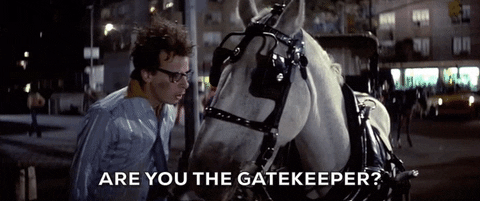
Are you the gatekeeper? Well, are you?
Lately, I’ve been looking back at a piece of email that was sent to me a couple of years ago. Essentially, it was a reader who had come across my then-five-year-old piece on microfilm, also known as microfiche.
He was upset. He had taken to questioning whether it was right for me to say that using a microfiche machine was difficult to use, or clunky.
And when I pointed out that I only said it was clunky compared to a smartphone, a more common way that people scroll through and zoom into images, he criticized the smartphone as dumbed down. Then I pointed out something I’ve mentioned many times but doesn’t always get through to more experienced users: I’m writing for regular people, not experts.
That was when he started to jab harder. He leaned into something I wrote in the piece noting that most researchers use the internet, suggesting that what I really meant was databases. (I didn’t.)
He then asked: “If you really aren’t an expert on this, why are you fighting me when I say microfilm viewers aren’t intuitive?”
Finally, he tried attacking my age, suggesting that I had been born in the ’90s and had not experienced technology before a smartphone (neither point is true), and that I didn’t understand what I was saying.
I responded simply, then ended the thread: “Your elitism is showing.” He replied again, but I left the thread by that point. I had nothing else to say.

(Masaaki Komori/Unsplash)
I think a lot about this thread because it reminds me of a lot of interactions I see online, where someone who thinks they know more than others about a topic falls into gatekeeper mode.
Look, I get it, there are people who think they are experts on given topics, who know everything. I think, for example, I know a bit about digital publishing because of the fact that I’ve been doing it for quite a long time. But while I have strong opinions on walled gardens such as Substack, I ultimately don’t want to push people away from something that’s working for them—rather, I just want to highlight, hey, you have options.
I think that when it comes down to it, the gatekeeper approach has its limits for cultural growth. It is designed to discourage others from showing an interest in new topics, rather than finding ways to introduce them to new topics. If you walk into a situation where you’re relatively green on a given topic, God help you.
I think some of this is out of protection—we want to ensure that our little corner of the cultural world is safe in some way. But at the same time, it naturally leaves others out.
If you’re an expert on something and your approach is to demean or otherwise criticize others who think differently on an issue than you do, you are doing more damage to your reputation than you probably even realize.
Open up the tent. Give yourself—and your hobby or career—some room to breathe.
Time limit given ⏲: 30 minutes
Time left on clock ⏲: 41 seconds



